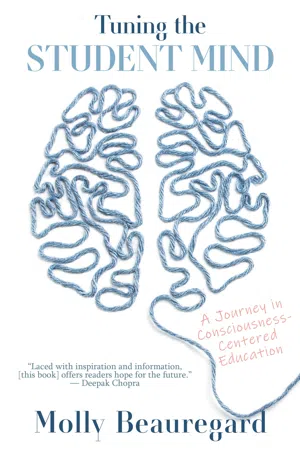![]()
Appendix
Consciousness-Centered Education Programming: Lessons from Five Years of Quality Improvement Data
Molly Beauregard, MPA, MA, Lead Researcher
Elizabeth McQuillen, MEd, PhD, Data Analyst, Wayne State College of Nursing
Emily Birchfield Shakibnia, MPH, Program Consultant
Introduction
My interest in consciousness-centered education sprung from my concern that students were not happy in my classroom. Over the course of several semesters, increasingly distracted, overwhelmed, and anxiety-ridden young people tugged at my heartstrings. As recounted in this book, evidence-based research on meditation validated my approach to integrating contemplative practices in the classroom.
This book offers personal reflections from over seven years of teaching this curriculum. The following section shares some hard data collected over this same period. It is my hope that this data-driven section will offer other educators a leg up in their own efforts to find support for innovative, consciousness-centered curriculum initiatives.
Methods
As explained in this book, my Consciousness, Creativity, and Identity course at the College for Creative Studies in Detroit, Michigan has been developed with the intention of providing consciousness-centered education programming for my students. In an effort to understand the effects and improve the quality of my course, I have traditionally had students evaluate their experience through self-reported surveys. A mixed methods approach is utilized in order to comprehensively capture student experiences and opinions of the meditation practice, in their own words.
To date, surveys have been conducted from the fall semester of 2012 through the winter semester of 2018. I did not conduct surveys during the Fall 2014–Fall 2015 semesters; rather, I was focused on organizing a new training sequence as I explored utilizing a different meditation style for the course. Given the evolving nature of my evaluation efforts, the surveys have developed and changed over time as I have homed in on what exactly I want to measure. For purposes of this appendix, I will refer to the different surveys and subsequent data as Phase 1 (Fall 2012–Winter 2014), Phase II (Winter 2016–Fall 2017), and Phase III (Winter 2018). Presurveys were distributed on the day of the meditation training, toward the beginning of the course, and postsurveys were distributed on the last day of the course (only data from the postsurveys were analyzed for this appendix). In all cases, students were verbally informed of the survey purpose, their ensured anonymity, and that there would be no academic impact, whatsoever, from the survey. Students who consented began the survey, and I remained present in the back of the classroom. Data were analyzed and written up by a data analyst at the Wayne State University College of Nursing with assistance from a consultant.
Phase I
Fall 2012–Winter 2014
Class size of 20–21 students (eighty-three sets of data)
Students learned Transcendental Meditation
In a twenty-three-item survey, students were asked to respond to a series of quantitative and qualitative questions regarding how they felt after starting their Transcendental Meditation practice, as well as any benefits that they had noticed due to their practice. The primary quantitative question was “Please tell us how you have felt since starting the Transcendental Meditation program” with answer statements such as “Happy,” “Depressed,” “Anxious,” and “Hopeful.” The answer statements were rated on a five-point Likert scale with response options of “Much More,” “A Little More,” “No Change,” “A Little Less,” and “Much Less.” Students also responded to qualitative questions, including “Please describe in some detail any benefits you have experienced from Transcendental Meditation practice.” Quantitative data were analyzed by transcribing the numerical correlations of each student’s response (i.e., “Much More” = 5); responses were then combined to assess an overall average change in attitude or emotion of the entire group.
Phase II
Winter 2016–Fall 2017
Ninety-eight sets of data
Students learned Primordial Sound Meditation
In a four-part quantitative survey with forty-nine total items, students were asked to respond to questions regarding their emotions, feelings, and personality. Fourteen of the items asked about how often the student felt a particular emotion in the past four weeks, including questions such as “How often have you felt nervous and ‘stressed’?” These items were rated on a five-point Likert scale ranging from “Never” to “Very Often.” Twenty-one of the items asked students to make assessments about themselves, using a five-point Likert scale ranging from “Not like me at all” to “Very much like me.” The remaining fourteen items asked students to respond to statements detailing how they felt in the past seven days, including statements like “I feel peaceful.” These items were rated on a five-point Likert scale ranging from “Not at all” to “Very much.” Data were analyzed using Cronbach’s Alpha to assess the reliability of the instrument, as well as a Varimax component factor analysis. Variables that did not fall under a factor due to lack of sufficient correlation were removed from analysis. Missing data were excluded.
Phase III
Winter 2018
Twenty-six sets of data
Students learned Primordial Sound Meditation
In a nineteen-item survey, students were asked to respond to a series of quantitative and qualitative questions. Seven items were demographic questions, and the remainder assessed their emotions and feelings, their ability to connect with and successfully complete their coursework, and, finally, their experience with meditation. These included questions such as “In the past four weeks, how often were you able to complete and turn in the assignments for all of your classes on time?” and “Please circle the response that most accurately describes your feelings toward the following statements: Meditating makes me feel less stressed; Meditating helps me to succeed in school; Meditating helps me to be more tolerant.” These were rated on four- or five-point Likert scales, depending on the question. Finally, students were asked to respond to qualitative questions including “What do you hope to gain from practicing meditation this semester?” and “Do you find it easier to meditate as a group or by yourself? Please describe your experiences.” Data were analyzed using Wilcoxian Signed Rank and Kendall’s Tau-b Test...
